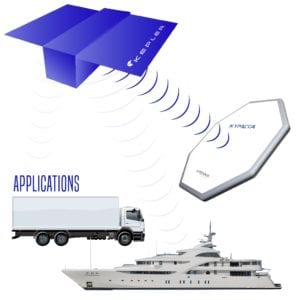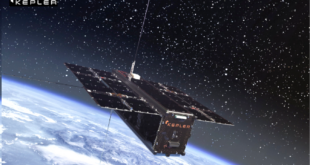 Kepler Communications, a pioneer of nano-satellite telecommunications solutions, today announces that it has successfully demonstrated compatibility between its low-Earth orbit (LEO) satellites with a commercially-available, flat-panel satellite antenna purchased from Kymeta. This testing marks the first time a Kymeta antenna has been used to demonstrate integration with an operational LEO satellite system.
Kepler Communications, a pioneer of nano-satellite telecommunications solutions, today announces that it has successfully demonstrated compatibility between its low-Earth orbit (LEO) satellites with a commercially-available, flat-panel satellite antenna purchased from Kymeta. This testing marks the first time a Kymeta antenna has been used to demonstrate integration with an operational LEO satellite system.
Kepler was able to successfully track and exchange data with Kymeta’s u7 electronically steered antenna (ESA) and Kepler’s two technology demonstration satellites, achieving data transfer speeds of 15 Mbps down and 5 Mbps up, in repeated trials.
“We are truly excited about the future applications that can now be enabled by Kymeta’s u7 antenna and our high-capacity, low-cost LEO platform,” said Wen Cheng Chong, Chief Technology Officer at Kepler. “For our customers it is important to gain access to a wide range of user hardware to respond to challenging operational and system specifications. The demonstrated ability to take the currently available u7 and have it connect with our satellites makes the Kymeta ESA a great addition to our growing portfolio of compatible antennas.”
Kepler’s Global Data Service (GDS), currently enabled by Kepler’s first two satellites in orbit, is a high-capacity data communication service. Covering every part of the globe, from pole to pole, GDS allows the movement of Gigabytes of data to and from the user’s location at economic rates. The store-and-forward nature of the solution makes it suitable for delay-tolerable data such as large multimedia files, high-resolution videos and imagery, and other bandwidth-intensive data within the maritime, oil & gas, tourism, and scientific communities.





